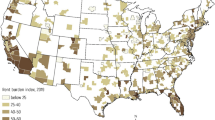Abstract
An earlier experiment demonstrated that the case-wise form of data analysis and presentation can improve the utilization, assimilation, recall, and recognition of poverty data in a priority setting task. As an alternative to the conventional variable-wise form, the case-wise form defines and identifies qualitatively distinct types of cases through cluster analysis. This paper reports on housing experiments designed to replicate the earlier results. However, the housing experiments unexpectedly dislosed some key interactions among task descriptions, policy preconceptions, and data presentations, including their forms. These interactions qualify and broaden the earlier results but corroborate the underlying theoretical model. They also clarify practical means of increasing the return on the public's investment in data resources to improve policy decisions.
Similar content being viewed by others
References
Breyer, J.M., & Trice, H.M. (1982). The utilization process: A conceptual framework and synthesis of empirical findings.Administrative Science Quarterly, 27, 591–622.
Brunner, R.D. (1983). Case-wise policy analysis: Another look at the burden of high energy costs.Policy Sciences, 16, 97–125.
Brunner, R.D. (1986). Case-wise policy information systems: Redefining poverty.Policy Sciences, 19, 201–223.
Brunner, R.D. (1987). The principle of proximal similarity.Knowledge: Creation, Diffusion, Utilization, 9, 145–160.
Brunner, R.D., Fitch, J.S., Grassia, J., Kathlene, L., & Hammond, K.R. (1987). Improving data utilization: The case-wise alternative.Policy Sciences, 20, 365–394.
deNeufville, J.I. & Barton, S.E. (1987). Myths and the definition of policy problems: An exploration of home ownership and public-private partnerships.Policy Sciences, 20, 181–206.
Dery, D. (1984).Problem definition in policy analysis. Lawrence: University of Kansas Press.
Dunn, W.N. (1988). Methods of the second type: Coping with the wilderness of conventional policy analysis.Policy Studies Review, 7 (Summer), pp. 720–737.
Edelman, M. (1977).Political language: Words that succeed and politics that fail. New York: Academic Press.
Gilsinan, J.F., & Volpe, L.C. (1984). Do not cry wolf until you are sure: The manufactured crisis in evaluation research.Policy Sciences, 17, 179–191.
Kaplan, A. (1963).American ethics and public policy. New York: Oxford University Press.
Kennedy, M.M. (1983). Working knowledge.Knowledge: Creation, Diffusion, Utilization, 5, 193–211.
Lasswell, H.D. (1960). The structure and function of communications in society. In W. Schramm (Ed.)Mass Communications (pp. 117–130). Urbana: University of Illinois Press.
Lasswell, H.D. & Kaplan, A. (1950).Power and society. New Haven: Yale University Press.
Lippmann, W. (1965).Public opinion. New York: The Free Press.
Medin, D.L. & Smith, E.E. (1984). Concepts and concept formation.Annual Review of Psychology, 35, 113–138.
Phillips, L.T., & Phillips, K.B. (1984). Research, politics, and the dynamics of policy development: A case study of motor carrier regulatory reform.Policy Sciences, 17, 364–384.
Rein, M. (1976).Social science and public policy. New York: Penguin.
Rosch, E. (1978). Principles of categorization. In E. Rosch, & B.B. Lloyd (Eds.)Cognition and categorization, (pp. 27–47). Hillsdale, NJ: Lawrence Erlbaum Associates.
Rosch, E., Simpson, C., Miller, R.S. (1976). Structural bases of typicality effects.Journal of Experimental Psychology: Human Perception and Performance, 2, 491–502.
Schön, D.A. (1979). Generative metaphor: A perspective on problem-setting in social policy. In A. Ortony (Ed.)Metaphors and thought (pp. 254–283). Cambridge: Cambridge University Press.
Sokal, R.R. (1974). Classification: Purposes, principles, progress, prospects.Science, 185, 1115–1123.
Thompson, M., & Wildavsky, A. (1986). A poverty of distinction: From economic homogeneity to cultural heterogeneity in the classification of poor people.Policy Sciences, 19, 163–199.
T-upversky, A., & Kahneman, D. (1983). Extentional vs. intuitive reasoning: The conjunction fallacy in probability judgment.Psychological Review, 90, 293–315.
Weiss, R.D. (1982). Measuring the need for low-income income energy assistance. In H.H. Landsberg (Ed.)High Energy Costs: Assessing the Burden (p. 121–125). Washington, D.C.: Resources for the Future.
Author information
Authors and Affiliations
Additional information
Ronald Brunner is professor of political science at the University of Colorado at Boulder. Lyn Kathlene is a Ph.D. candidate in political science at the University of Colorado at Boulder.
Rights and permissions
About this article
Cite this article
Brunner, R.D., Kathlene, L. Data utilization through case-wise analysis: Some key interactions. Knowledge in Society 2, 16–38 (1989). https://doi.org/10.1007/BF02687219
Issue Date:
DOI: https://doi.org/10.1007/BF02687219




